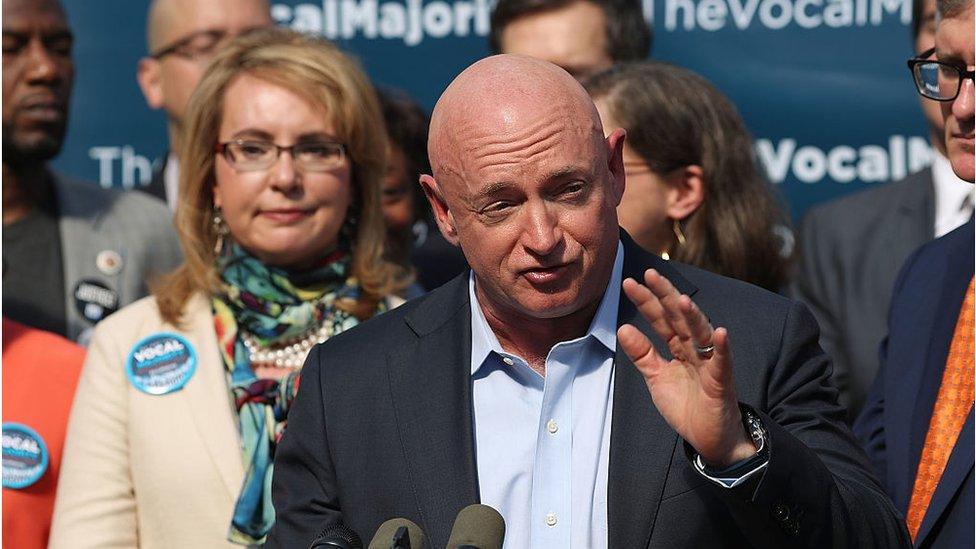US election 2020: The five Senate races to watch
- Published

Ready to run... astronaut Mark Kelly, football coach Tommy Tuberville and trucker hat-wearing Kelly Loeffler
"An astronaut, a pastor and an American football coach walk into the US Senate" sounds like the beginning of a joke, but that is what could happen when winners of the 2020 general election take their seats in Congress.
While attention has been hyper-focused on the battle for the White House between Donald Trump and Joe Biden, an equally important fight is underway for control of Congress on 3 November.
The Democrats already have control of the House of Representatives, so they are looking to keep hold of it, while also gaining a majority in the Senate.
Republicans hold a thin three-seat advantage in that chamber, and there are 35 senators up for re-election - a good many of whom are vulnerable.
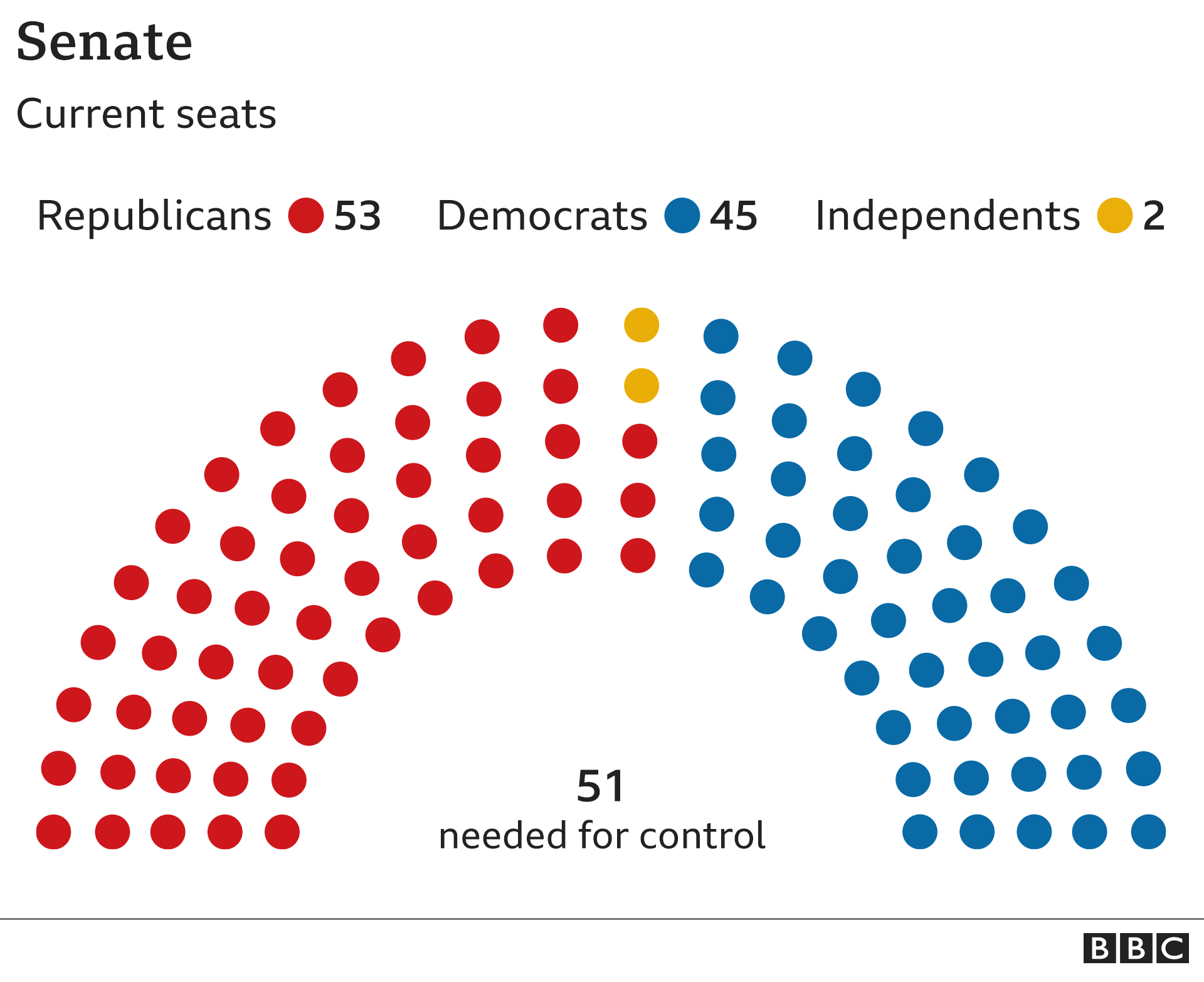

A Democratic-controlled House and Senate would have the power to obstruct the plans of a second-term President Trump, or push through the agenda of a first-term President Biden.
These five races, which underline the key battle lines in US politics, are some of the seats most at risk of flipping.
1. Arizona
Charismatic astronaut threatens Trump's Senate agenda
This contest could have an immediate effect on the last three months of the current Trump presidency.
This is because the contest between Democrat Mark Kelly and Republican Martha McSally is a "special race" to fill a seat occupied by the late senator John McCain, who died in 2018.
Unlike with other races, should Mr Kelly win, the former astronaut could be seated in the US Senate as early as November 30, rather than in January.

Kelly and McSally debate in Phoenix
With a current 53 seats in the Senate, President Trump has a solid Republican majority but it's not invulnerable - at least three moderates in his party have been willing to break rank with his agenda before. Should Mr Kelly arrive in the Senate next month, Mr Trump's hopes to rush through favoured policies before his first term is up could well vanish.
Former air force pilot Ms McSally, 54, was given the seat by appointment from the Republican governor. She already lost a Senate race in Arizona in 2018 and polls suggest it will be an uphill climb for her to avoid a second defeat now.
Mr Kelly also has a poignant personal story - his wife, the ex-Arizona congresswoman Gabby Giffords, was shot at a public event with constituents and suffered serious brain injuries. The couple have been among the most visible advocates for gun control since the 2011 incident.
2. South Carolina
Powerful Trump ally at risk
Republican bigwig Lindsey Graham, a former Trump critic who has turned into one of his most vocal supporters, is facing a strong challenge from Jaime Harrison, a former lobbyist and chairman of the state Democratic Party.
Polls put the two men on even footing going into October, though the Republican has since made up some ground. Still, according to analysts, South Carolinians are unhappy with Mr Graham's transformation from an outspoken small-government, hawkish foreign policy-focused conservative, to a full-throated backer of Trumpism.
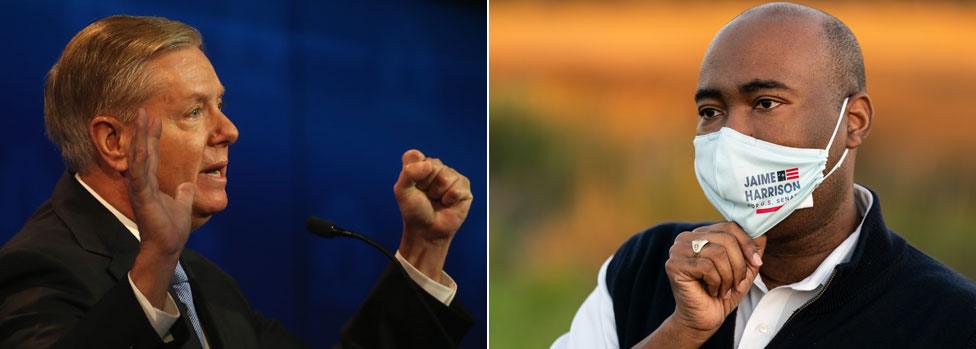
No one expected this race to be so close
The race was once considered Mr Graham's for the taking, but the senator has found himself vulnerable after his opponent raised a record $57m (£44m) in campaign funds in a single quarter. Mr Graham, 65, managed only half the amount.
Should the now-powerful chairman of the judiciary committee lose to Mr Harrison, 44, it would not only be a massive political upset, but also mark the first time the southern state would be represented by two black senators.
3. Maine
The slow death of moderate America
Voters in Maine look set to punish one of the few moderate Republican senators still in office, Susan Collins, in a race that underscores just how tricky it is to be a centrist in the age of Trump.
Ms Collins, 67, used to be one of the most popular senators serving in the chamber, but now trails her Democratic rival Sara Gideon.
The difficulty for Ms Collins lies in being a Republican who represents a centre-right constituency in a state where Mr Trump is deeply unpopular.
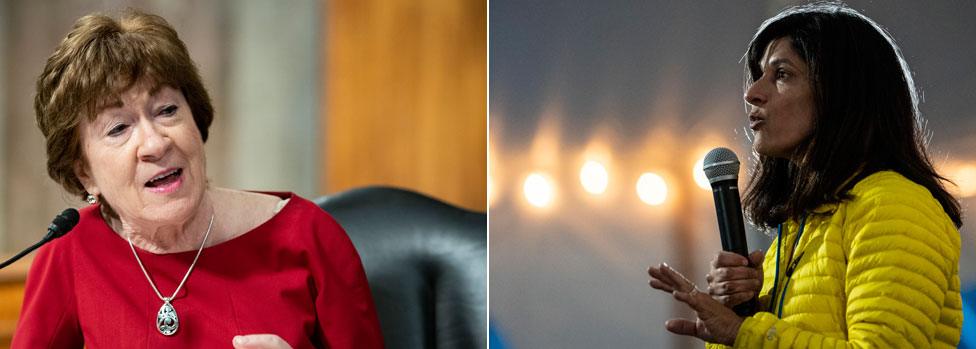
Susan Collins is fighting for her political life against Sara Gideon
She was widely criticised for backing the president's controversial 2018 Supreme Court pick, Brett Kavanaugh, despite allegations of sexual misconduct from the 1980s. Since then, she has not been able to shake off accusations of secret fealty to Mr Trump.
Several groups that used to back her including Planned Parenthood, Human Rights Campaign and the League of Conservation Voters, are now supporting her rival Ms Gideon, 48.
4. Georgia
Will demographics finally favour the Democrats?
Democrats have not won Georgia since 1992 but more liberal-leaning, young people are moving to the state, and Hillary Clinton did very well in the Atlanta suburbs four years ago.
Now two of the state's Senate seats are up for grabs. A regular general election pits incumbent Republican David Perdue, a former executive of the Dollar General discount chain store, against Jon Ossoff, a young former journalist.
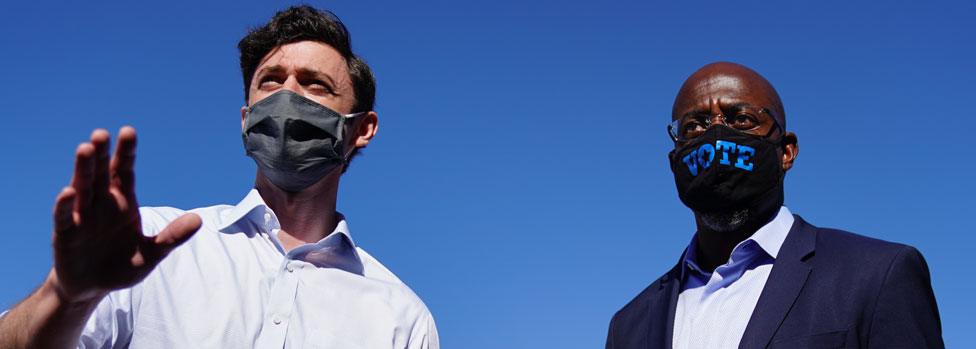
Two Democratic challengers Jon Ossoff and Rev Raphael Warnock
Mr Ossoff, 33, lost a special election in 2017 for the House - but now has his sights on a higher, state-wide office and is neck-and-neck with Mr Perdue, 70.
The party has a rare second chance to capture a seat in Georgia (normally only one Senate seat is up at a time) owing to a special election. Though a charismatic Democratic candidate leads the race - Raphael Warnock, a pastor at the historically black Ebenezer Baptist Church - it is far from a predictable one.
The incumbent senator Kelly Loeffler, who was appointed, is in trouble over her handling of the coronavirus.

Kelly Loeffler and David Perdue are the sitting senators
Ms Loeffler, 49, is accused of using insider government knowledge about the virus for financial gain, and now faces challenges not only from Democrats, but also from her own party.
With the Republican vote split, a run-off election is expected in January, as no candidate has 50% of the vote.
5. Alabama
Where the future of Trumpism is alive and well
This election in Alabama represents a rare bright spot for the Republican party to flip a Democrat-held seat.
Doug Jones, the incumbent Democrat, triumphed in a special election in 2017 after the Republican candidate became embroiled in a sexual abuse scandal.
The victory was an anomaly and now, the deeply conservative state is likely to vote him out, as they view the Democratic Party with scepticism.
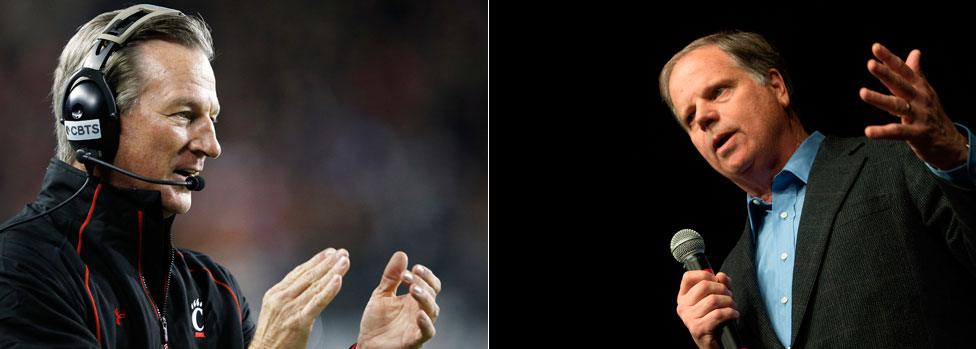
Tommy Tuberville is heavily favoured to unseat Senator Doug Jones
Mr Jones trails 10 percentage points behind Republican Tommy Tuberville, a former university American football coach backed by President Trump.
The race demonstrates that whatever the outcome of the presidential contest, there are parts of America where Trumpism will continue to resonate.
- Published23 October 2020

- Published16 October 2020

- Published12 February 2019
